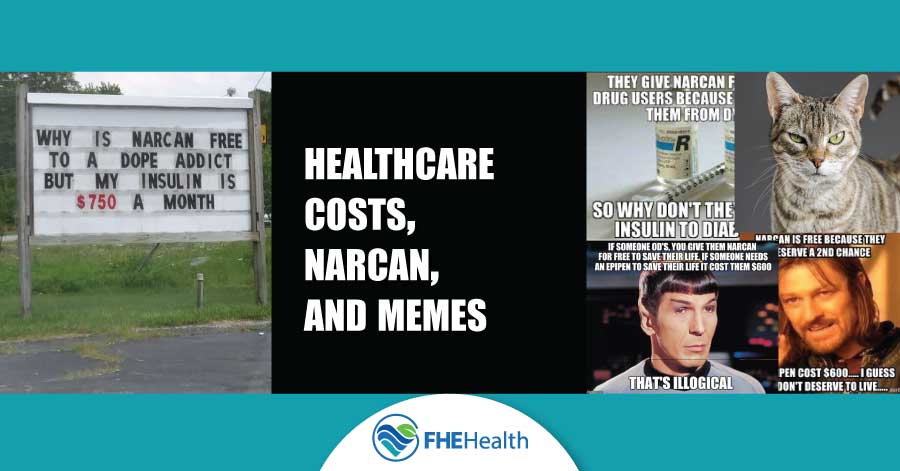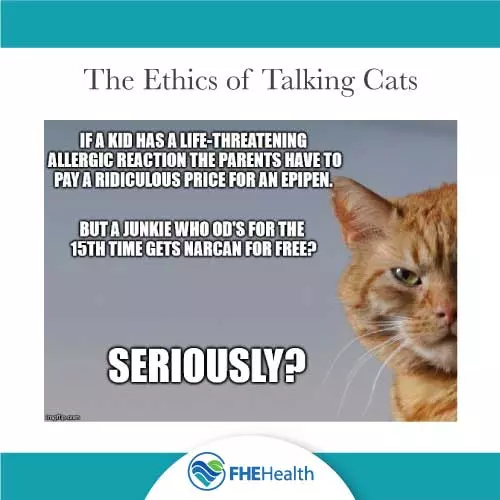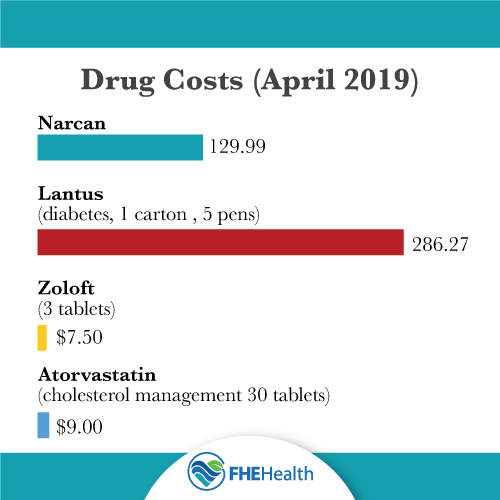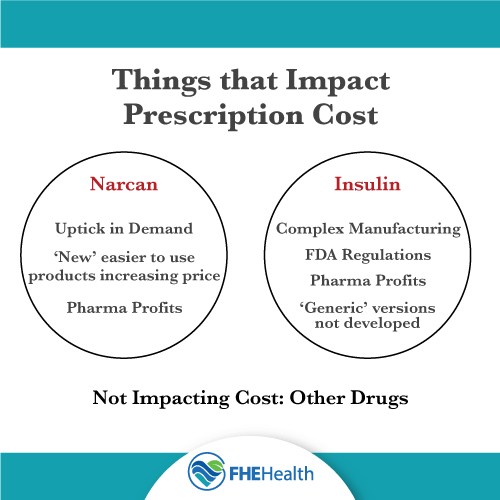
Updated September 26, 2019
“If a kid has a life-threatening allergic reaction, the parents have to pay a ridiculous price for an EpiPen. But a junkie who OD’s for the 15th time gets Narcan for free? Seriously?” That’s the popular gripe of a meme that has proliferated across the Internet, raising the need for a closer look at the lesser-known drug Narcan, its lifesaving capabilities, and why it can be controversial….
For many people battling drug addiction, access to Narcan (the brand name for naloxone) is what helped them survive a drug overdose and, in turn, seek treatment. It’s unquestionable that Narcan saves lives. One study found that 93.5 percent of people who were given this drug during a medical emergency outlived an overdose that would otherwise have been lethal. This one fact alone justifies making the drug more widely available at little or no cost to those in need, especially when overdose rates have been at historic highs in recent years.
Yet, for many people—specifically non-drug users—this equation can seem unfair. Why, their logic goes, should those who use illicit drugs and/or have drug addictions be given easy access to Narcan when they (as non-drug users) must pay exorbitant prices for their own medication? After all, an EpiPen is also a life-saving drug that can reverse a potentially life-threatening allergic reaction, yet isn’t so affordable and easy to access. On the contrary, an Epipen can cost hundreds of dollars, whereas Narcan is cheap or free.
That discrepancy can seem very frustrating. But it’s also implying a causal relationship between high-cost Epipens and low-cost Narcan. In reality, there’s no connection between why people are paying so much for Epipens, insulin and other drugs and not having to pay the same prices for Narcan.
What Narcan Really Is: A Life-Saving Drug Like Many Others
 Consider, for a moment, what happens when a person has a stroke and an emergency response team responds to their 911 call. The protocol is to transport the person having the stroke to the ER. Meanwhile, on the way to the ER, the paramedics administer anticoagulants in high doses, which help to break up a clot that could be contributing to the stroke and could reduce the impact of brain damage.
Consider, for a moment, what happens when a person has a stroke and an emergency response team responds to their 911 call. The protocol is to transport the person having the stroke to the ER. Meanwhile, on the way to the ER, the paramedics administer anticoagulants in high doses, which help to break up a clot that could be contributing to the stroke and could reduce the impact of brain damage.
Similarly, if a person is having a heart attack, paramedics administer nitroglycerin. It works immediately to reverse the impact of the heart attack, helping to preserve heart muscle. A person suffering a shock from too little glucose in their bloodstream may benefit from glucagon, if it’s administered immediately.
In each of these situations, the paramedic takes immediate action to prevent death using some very costly drugs long before a person reaches a hospital. And, in each of these cases, the use of anticoagulants, glucagon, and nitroglycerin would not be controversial. No one would tell an EMS team not to administer these drugs to those in need. We don’t blame them—regardless of whether a stroke or heart attack was the result of poor lifestyle choices such as diet, smoking or not exercising—and we don’t question, “Why is your healthcare free and I have to pay for mine?”
Narcan does the very same thing that anticoagulants, glucagon, and nitroglycerin do in medical emergencies: It prevents unnecessary deaths, regardless of what the lifestyle choices of the person in need may be.
What Does the Disease of Addiction Do to a Person?
Did you know that many people who receive a dose of Narcan fight back? They don’t want it because Narcan immediately stops the euphoric high the drug provides. In truth, a person who seeks out this type of high at such great personal risk has a treatable disease known as a “substance use disorder.”
Addiction means a lack of control. Those who compulsively seek out a substance despite the negative consequences are doing so because they have a chemical dependency and behavioral addiction. They can’t just say “no” and stop using the drug. According to its pathology as a disease, addiction limits a person’s ability to make the right choice. (Learn more about why addiction is a disease.)
In a similar vein, people with other diseases can often make unwise or unhealthy choices. Take diabetes, for example. A person with diabetes may know that their body doesn’t process carbohydrates correctly. They may know they risk problems if they don’t maintain their blood glucose levels properly. Yet they still may choose to consume the wrong foods, creating high-risk health scares for themselves.
In the same way, people with an addiction lack the ability to simply say no. Further complicating their sobriety, the addiction has changed the chemical makeup of their brain so that their body now demands that substance. Without it, they feel intense pain and cravings known as withdrawal, symptoms of which can vary depending on the drug involved.
Beyond the Meme: Addicts Need Help
Many people who shared this meme on social media are tying it to the concept of responsibility. A person with a drug addiction seems to be irresponsible rather than sick. Still, wouldn’t it be more beneficial to provide help that lifts them up? Is the meme really doing anything to improve their situation?
Someone who has arrived at a situation where they need Narcan needs help and support so they can pursue recovery. Providing that support changes lives for the better and in the longer run can reduce the need for Narcan. What won’t reduce the need for Narcan is shaming “junkies” into better behavior. This public perception only succeeds in discouraging funds toward rehabilitation, by shifting blame onto the user rather than focusing on what can help them (which is better care).
What About Drug Costs?
 The truth about medication costs is the same for any drug. Insulin’s cost is what it is for the same reason that Narcan’s costs are what they are: Companies manufacturing these drugs often control the market enough that they can set their own prices. They can charge what the market is willing to pay for the drugs.
The truth about medication costs is the same for any drug. Insulin’s cost is what it is for the same reason that Narcan’s costs are what they are: Companies manufacturing these drugs often control the market enough that they can set their own prices. They can charge what the market is willing to pay for the drugs.
A better way of looking at these costs, then, is to consider what could be done to make all drugs, including Narcan and insulin, more readily available or, even better, less needed. One route is changing the way health care operates. Politics aside, it’s clear that changes are necessary to ensure that people don’t have to go without drugs that could save their lives because they can’t afford these drugs. Reducing other costs related to health care might also be helpful.
It’s possible that many people sharing these types of images are more interested in bringing down the cost of critical medication like Epi-pens than they are in withholding life-saving medication from drug users— but the words that we use do matter.
Reducing the Demand for Narcan Offers the Better Outcome
 The best way to combat the need for Narcan is not to limit its access and allow those with an addiction to die. Rather, it is to create a robust addiction and mental health care system. This makes it possible to support and even prevent the need for the drug in the first place. Having a strong program in place could help support those communities in desperate need of treatment solutions.
The best way to combat the need for Narcan is not to limit its access and allow those with an addiction to die. Rather, it is to create a robust addiction and mental health care system. This makes it possible to support and even prevent the need for the drug in the first place. Having a strong program in place could help support those communities in desperate need of treatment solutions.
What You Can Do
Consider becoming an advocate for change. Educate yourself about how the disease of addiction works. Learn more about local programs that need help in supporting recovery efforts. If you see a person struggling with addiction, help them find the assistance they need. They may not have another person to advocate for them and help them overcome their addiction. You may be that one person whose helping hand saves a life.
FHE Health Offers That Support
Undoubtedly, if a person needs emergency medical care due to a potential overdose, call 911. If you or a loved one have an addiction, seek out help from FHE Health. Our team of compassionate, trusted professionals is ready to answer all of your calls, and we’re available 24/7 at (833) 596-3502.






